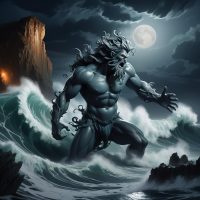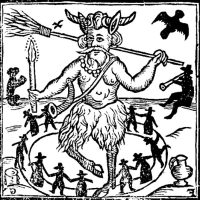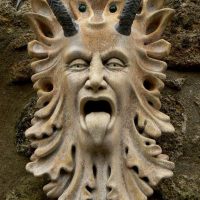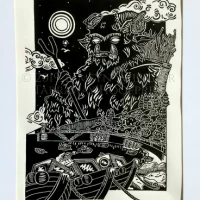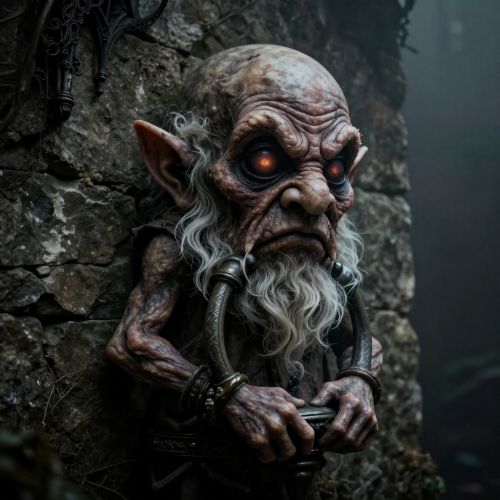Bucca : The Sea Spirit of Cornish Mythology
Listen
At a glance
| Description | |
|---|---|
| Origin | Cornish Mythology |
| Classification | Spirits |
| Family Members | N/A |
| Region | United Kingdom |
| Associated With | Storms, Sea |
Bucca
Introduction
Bucca is one of the most enduring spirits in Cornish folklore, embodying the mysterious relationship between the people of Cornwall and the sea that defines their history. Described as a sea-spirit, hobgoblin, or elemental force, Bucca personifies the raw and unpredictable nature of the ocean. His legend originated among the fishing and mining communities along Cornwall’s rugged coast, where offerings were once made to ensure calm seas and safe returns. The name “Bucca” is believed to derive from an old Cornish or Old English root meaning “spirit” or “ghost,” linking him to a family of Celtic trickster beings such as the Irish Púca and Welsh Pwca. Over time, Bucca’s image shifted from that of a feared maritime deity to a folkloric guardian who bridges the worlds of men and spirits, nature and superstition.
Physical Traits
Descriptions of Bucca’s appearance differ across Cornwall’s coastal tales, but he is generally portrayed as a dark, merman-like being with features shaped by the sea. His skin is often described as glistening brown or greenish, resembling seaweed or eel hide, while his tangled hair flows like strands of kelp. In the tale of “The Sea Bucca of Lamorna,” he is depicted as a solitary figure haunting sea caves and rocky shores, emerging from the surf to watch fishermen from afar. In some accounts, Bucca takes on a more monstrous aspect, with webbed hands and sharp teeth that hint at his connection to the deep. Other versions grant him the ability to shape-shift, transforming into a black bull or horse that gallops along the cliffs during storms—a motif common to Celtic sea-spirits. His dual appearance—both humanlike and monstrous—reflects his ambivalent nature as both protector and destroyer.
Family
Traditional Cornish sources do not mention a family for Bucca, but his mythology includes the existence of two contrasting forms: Bucca Dhu (the dark or black Bucca) and Bucca Gwidden (the light or white Bucca). These twin spirits represent the sea’s dual temperament—kind and cruel, calm and tempestuous. Bucca Dhu embodies the wild forces of the storm, associated with destruction and the winter season, while Bucca Gwidden symbolizes fair weather, guidance, and abundance. This duality may represent the balance between creation and chaos that defines the natural world. In comparative Celtic mythology, Bucca’s counterparts, such as the Irish Púca and the Welsh Pwca, also display similar contrasts of mischief and benevolence, suggesting a shared mythological lineage of liminal, shape-shifting spirits. Some scholars even see Bucca as the male counterpart to Breton water spirits known as Mari-Morgans, linking him to a broader pan-Celtic belief system that blurs the line between gods, ghosts, and natural forces.
Other names
Bucca appears under various names across different parts of Cornwall, reflecting the local dialects and his many interpretations. Variants such as Bocka, Bockyas, Bucca Dhu, and Bucca Gwidden all refer to different aspects of the same being. “Bucca Boo,” meanwhile, entered Cornish folklore as a bogeyman figure used to frighten misbehaving children—an echo of his once-feared divine status. Linguistically, “Bucca” is related to the Old English puca and the Irish púca, both meaning a mischievous or ghostly being, revealing a shared Celtic heritage. Reverend W. S. Lach-Szyrma, a 19th-century scholar of Cornish tradition, proposed that Bucca may have once been a local sea god akin to the Celtic deities Nodens or Nechtan, later reinterpreted as a folkloric spirit after Christianity took hold in Cornwall. This reinterpretation mirrors a common pattern in Celtic regions, where pagan deities were absorbed into Christian folk tradition under lesser, more domestic guises.
Powers and Abilities
Bucca’s powers stem from his elemental dominion over sea, wind, and storm. As a sea-spirit, he can summon tempests when angered or bless fishermen with calm waters and plentiful catches when appeased. Fishermen traditionally left offerings of fish or bread on the beach—especially at Newlyn and Mousehole—to gain his favor, a ritual reminiscent of ancient pagan practices. Legends also attribute to Bucca a prophetic nature; his voice, carried by the wind, was said to warn sailors of incoming storms. Some tales describe him as a guardian of miners, a connection that links him to the subterranean spirits known as Knockers, who protected Cornwall’s tin miners. In magical and neopagan traditions, Bucca’s dual aspects have been integrated into modern witchcraft as symbols of light and darkness, creation and destruction. Modern practitioners, particularly those in the Cornish witchcraft revival, view him as a chthonic deity governing the cycles of nature—storms, fertility, and transformation. His shape-shifting ability represents his fluid nature, crossing the boundary between elements, realms, and states of being.
Modern Day Influence
Bucca’s presence endures in Cornwall’s cultural memory, both as a remnant of its seafaring folklore and as a revived spiritual symbol in modern neopaganism. Though offerings to Bucca faded with the rise of Christianity, echoes of his worship survived in the 19th century when fishermen still left food on the sand before setting sail. Today, Bucca is celebrated as a symbol of Cornwall’s Celtic identity and ecological consciousness. Neopagan groups such as Ros an Bucca and Kord Bucca in Cornwall honor him as a representation of nature’s duality—benevolent yet unforgiving. His mythology has inspired literary works, including Jill Paton Walsh’s Thomas and the Tinners, in which Buccas are depicted as underground fairies assisting miners, reflecting his continued role as a protector of laborers and coastal folk.
Beyond Cornwall, Bucca has inspired modern pagan movements in places as far as New Zealand, where a branch of Alexandrian witchcraft known as “Boucca Wicca” emerged in the late 20th century. Scholars and practitioners such as Jean de Cabalis have expanded his mythos into esoteric systems emphasizing balance between storm and stillness. In contemporary art, Bucca appears in digital illustrations, folklore-inspired fantasy, and ecological storytelling as a metaphor for harmony between humanity and the natural world. His dual forms—Bucca Dhu and Bucca Gwidden—continue to serve as archetypes for spiritual balance, embodying themes of light and shadow that resonate across mythologies.
Bucca remains a living symbol of Cornwall’s spiritual landscape: a reminder of humanity’s respect for the forces that sustain and challenge life. Whether seen as an ancient god, a restless spirit, or a guardian of the sea, his myth persists as both cultural heritage and spiritual allegory, connecting modern Cornwall to its ancient, elemental roots.
Related Images
Source
Lach-Szyrma, W. S. (1872). Cornish Folklore and Antiquities. London: Trübner & Co.
Gary, G. (2015). Traditional Witchcraft: A Cornish Book of Ways. Troy Books.
“Bucca (mythological creature).” (2007). Wikipedia. Retrieved from https://en.wikipedia.org/wiki/Bucca_(mythological_creature)[1]
“From Ancient Tales to Modern Beliefs: Discover the Many Faces of Bucca.” (2024). Ruli Magazine. Retrieved from https://bs.ruli.com/article/from-ancient-tales-to-modern-beliefs-discover-the-many-faces-of-bucca
“Creature of the Week: Bucca.” (2021). Paranormal Archives. Retrieved from https://paranormalarchives.home.blog/2021/03/10/creature-of-the-week-bucca
“Cornish Folklore, Myths & Legends.” (2023). Wilderness England. Retrieved from https://wildernessengland.com/blog/cornish-folklore
“Bucca.” (2024). Wending Wayfarer. Retrieved from https://wendingwayfarer.com/bucca
“The Legend Lives On: Exploring the Significance of Bucca in Cornwall Today.” (2024). Ruli Publications. Retrieved from https://ie.ruli.com/article/the-legend-lives-on-exploring-the-significance-of-bucca-in-cornwall-today


